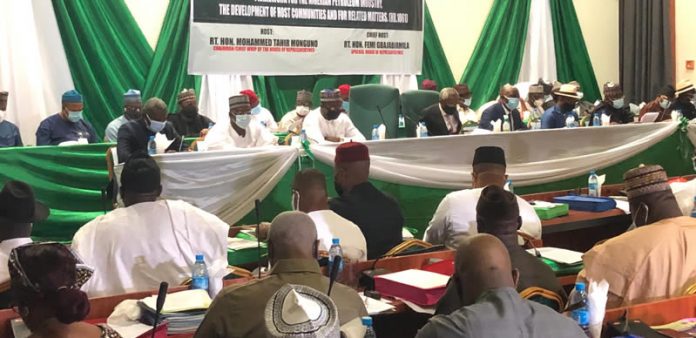People and rescuers gather at the site where a Nigerian air force plane crashed while approaching the Abuja airport runway, according to the aviation minister, in Abuja, Nigeria February 21, 2021. REUTERS/Afolabi Sotunde
The mishaps happened in quick succession. First, it was the *Bellview Airlines* flight 210. It originated from the Murtala Mohammed International Airport in Lagos that Saturday, October 22, 2005, and was destined for the Nnamdi Azikiwe International Airport in Abuja. A few minutes after takeoff, however, even when it was still within the precincts of the Lagos-Ogun megalopolis, the Boeing 737-200 aircraft nosedived in Lisa village in Ogun state, about 30 kilometres north of Lagos, killing all 117 people on board, including passengers and crew members. Top-level functionaries in the administration at the time and senior private sector chiefs were among the victims of the crash. The nation was enveloped in palpable lachrymose. The air mishap was a monumental calamity, even as interrogations into the cause of the air accident continued. Earlier that year, on March 27, 2005, another Boeing 737 in the Bellview fleet, had crash-landed with one of its engines catching fire.
Less than two months after the Lagos Bellview incident, December 10, 2005, a McDonnel Douglas DC-9-32, owned by *Sosoliso* airlines, crashed at the approach into the Port Harcourt International Airport, after taking off from the federal capital territory. Flight 1145 had 110 passengers on board, including many students of the Abuja-based Loyola Jesuit College, a highbrow secondary school, with students from across the country. Initially, there were seven survivors of the crash, but only two eventually made it.
Those two air incidents were not the only ones to have been witnessed during the administration of former President Olusegun Obasanjo. A Boeing 727-200 aircraft operated by *Chanchangi* Airlines, overshot the runway on June 11, 2005, at the Murtala Mohammed Airport. Another airplane had also overshot the runway at the Yakubu Gowon Airport in Jos, a day before the Lagos incident. Back on May 4, 2002, a BAC 1-11 aircraft operated by *EAS Airlines,* killing all 75 passengers on board, including Nigeria’s Sports Minister at the time, Ishaya Mark Aku. An additional fatality of 73 persons n the ground, brought the total number of victims of the tragedy, to 148. The Bellview and Sosoliso incidents, however, jolted Obasanjo to action.
The deeply perturbed former President, immediately set up a Presidential Task Force on the Aviation Industry, to probe into the root causes of the serial air crashes the nation had witnessed over the years, with particular emphasis on the air accidents which occurred under Obasanjo’s watch. The task force was headed by Paul Dike, an Air Vice Marshal, AVM, at the time and Air Officer Commanding, AOC, Tactical Air Command, Markudi. Dike would go all the way to become Nigeria’s first four-star air force general, when he was promoted Air Chief Marshal, under President Umaru Musa Yar’Adua’s administration, following his appointment as Chief of Defence Staff, CDS.
Advertisement
Dike, by the way, was not Obasanjo’s kinsman. One of Nigeria’s best-ever aviators, Obasanjo inherited Dike as Commander of the Presidential Air Fleet, known for short as PAF in government circles, from his immediate predecessor, General Abdulsalam Abubakar. Abubakar himself met Dike, who hails from Delta State, in the State House in the same capacity, when fate thrust him to the leadership of the country in 1998. The air force chief was deployed to that office by General Sani Abacha in 1997 and served diligently until Abacha’s demise. A substantial degree of of meritocracy and competence still characterised public service, away from the suffocating nepotism in contemporary statecraft.
The Dike-led inquiry made far-reaching recommendations including: Measures to tackle manpower shortage in the aviation industry; Need to provide bailout funding for troubled airlines; Imperative for the revival of aviation facilities; Recapitalisation by the airlines and the need for autonomy for the Nigeria Civil Aviation Authority, NCCA. The task force also proposed an age limit for aircraft flying in the nation’s airspace, which hitherto was popular among operators seeking to cut corners, so as to minimise the free reign of deathly contraptions in the nation’s air territory.
The body also made suggestions on the reorientation of air-worthiness inspectors on the necessary steps and checks they are to effect concerning ageing aircraft. Aviators are also to ensure that the most experienced professionals are assigned to inspect ageing aircraft and ascertaining the airworthiness of ageing aircraft. Aviation agencies were also mandated to develop in-house maintenance manuals, to serve as a standard against which maintenance performed levels could be measured at anytime. The Paul Dike task force made recommendations of what the federal government was supposed to do in the short, medium term long terms.
Advertisement
Compliance with, and enforcement of the recommendations of the Paul Dike task force, imposed some sanity on the aviation sector for a few years. Except for the crash involving 12 senior ranking military officers who died in an air crash aboard a military aircraft in Benue State, en route Obudu in Cross River State September 17, 2006 and an *ADC* airliner with 114 passengers on board which crashed after takeoff in Abuja October 29, 2006, the recurrence of fatal air accidents, were substantially reduced. Indeed, but for the crash of a McDonnel Douglas MD-83 operated by *Dana Air* on June 23, 2012, the frequency of air mishaps, reduced considerably after the work of the 2005 task force. The said Dana Air crash claimed 153 passengers, including the crew.
While, thankfully, there have been no crashes by passenger aircraft in recent years, developments in the aviation sector, that is recent experience in the mainstream civil aviation sector and the military segment, compel very urgent and holistic appraisal of this all-important sector, by the federal government. March 16, 2021, the NCAA had cause to suspend flights on *Azman Air* for about a week. The aviation regulatory body stated that it observed series of incidents involving the Boeing 737 aircraft in the fleet of the airline.
Two months later, on May 18, 2021, a Boeing 737 aircraft belonging to *Max Air* originating from Kano and destined for Abuja, had to make a quick air return shortly after takeoff. The aircraft was hit by a bird strike which damaged three of the blades in one of its engines. The Emir of Kano, Aminu Ado Bayero and 139 other passengers were on board the flight. On the same day, an *Aero Contractors* flight which took off from Port Harcourt was also hit by a bird strike 10 minutes after ascent and had to return to base. The aircraft, also from the Boeing 737 stock, had 90 passengers on board. Roused by the twin occurrences in one day, the House of Representatives mandated its Committee on Aviation to investigate both occurrences, which were ascribed to bird strikes leading to engine failure. Bala Sani Umar, a legislator who spoke under “matters of public importance,” noted that there were allegations on the part of airliners in applying safety precautions, culminating in these near fatalities.
On Friday July 23, 2021, an *Air Peace* flight into Ilorin, the Kwara State capital, lost one of its tyres upon landing. While the incident was initially misconstrued as a near-crash, the NCAA and the Accident Investigation Bureau, AIB, denied that there was a crash at the airport. The development ensured that there were no flights into the Ilorin airport, for about 48 hours. The aeroplane was subsequently moved to the hangar of the Nigeria Air Force, NAF, abutting the Ilorin airport.
Advertisement
The story is not any better in the military aviation sub-sector. This year alone, the air force has been involved in at least four air crashes, with varying degrees of fatalities. February 21, 2021, a Beechcraft King Air 350i, went down in Abuja, killing all seven officers on board the flight. On March 31, 2021, an Alpha jet, came down at Abba-Jille in Konduga local government area of Borno State, while supporting Nigerian troops battling insurgents in the North East of the country, claiming the lives of the pilot and co-pilot.
May 21, 2021, another military aircraft conveying the former Chief of Army Staff, Lieutenant General Ibrahim Attahiru, succumbed to bad weather in Kaduna, as it attempted to land during a rain storm. Attahiru who was appointed to the position on January 26, 2021 by President Muhammadu Buhari, had begun to give new fillip to the crackdown on insurgency and banditry, before the tragic incident. July 25, 2021, yet another Alpha jet deployed on an operation to rid the North West of the country of bandits and kidnappers, was brought down by enemy gunfire. Happily, Abayomi Dairo a flight lieutenant who flew the jet, successfully ejected before the plane hit the ground. Within a span of six months therefore, the Nigerian Air Force was involved in four fatal crashes, losing about 20 officers, with Dairo being the only survivor in this very worrying narrative.
If more advanced countries, say the United States of America, USA; the United Kingdom, UK; Russia; Germany or France were to suffer the kind of fatalities and loss of prized human assets, in peace time, which our leaders will make us believe we are in, they will take a few steps back to reappraise the situation and proffer panaceas. Over the years, particularly beginning from the era of General Ibrahim Babangida as President, military aviation in Nigeria has suffered gradual, but discernible dehydration and regression.
It has been suggested that for reasons of self-preservation and the mortal fear of the capabilites of the air force, successive administrations before the advent of democratic governance, paid scant attention to the redevelopment of the Service. It has been posited that the air force lost its position of preeminence in the ranking of the military services, because of this covert decimation of the service. This most probably explains why very young and largely inexperienced officers, mainly flying officers and flight lieutenants have been more involved in in the aerial operations of most of the recent military engagements across the country. These young pilots who, in their twenties, have only recently graduated from the defence academy and were deployed almost straightaway to the frontlines.
Advertisement
The aggregate quality and capability of Nigeria’s military today is a far cry from the military Nigerians knew in the 1980s and 1990s. Those were the years when the fear of Nigeria’s armed forces, was the beginning of wisdom, across the African continent. After pioneering the Economic Community of West African States Monitoring Group, ECOMOG, in Liberia, Sierra Leone and Guinea in the West African subregion, Nigerian troops became the bride courted by the United Nations, UN, as military pacifist even in East Africa. Nigerian troops were in the theatre of battle even in Somalia.
As it stands today, the situation in Nigeria’s aviation sector, re-echoes the 2005 scenario when aircraft were literally dropping from the skies, time and again. It calls for a very thorough and rigorous inquisition by the federal government and all stakeholders. Immediate remediation of this ailing and all-important department of our national life is of utmost priority for national security and wellbeing. While the serial loss of prized, albeit replaceable aviation infrastructure and equipment is bad enough, the recurring decimation of unquantifiable, invaluable human capital, particularly in the early, most productive years of service, is totally unacceptable.
Advertisement
Against the backdrop of the successful consolidation of Nigerian banks back in 2004, the consolidation of airlines has previously been mooted as one of the ways by which our airlines can be strengthened and become sustainable. It is said that there are about two dozen airlines operating in Nigeria at the moment. Before the consolidation of Nigerian banks in 2004, there were 89 banks. The Central Bank of Nigeria, CBN, under the leadership of Chukwuma Soludo, however, increased the minimum capital base of banks to N25 billion each. This precipitated a drastic drop in the number of banks to 25, by 2005. Smaller and weaker banks coalesced with the bigger ones, a development which mitigated the erstwhile trend of failed banks in the country. The recapitalisation of the banks ensured that some Nigerian banks were now listed among the top brands in Africa.
The idea of mergers between airlines to create stronger, more enduring brands, had previously been proposed as a potential solution to challenges in the industry. Air operators of one school of thought, however, have noted that mergers will remain impossible for a long time to come, because each airline brand, comes to the market with its peculiar model, which may not fit into the architecture of potential collaborators. Another school of thought believes that mergers will create bigger, stronger airlines, which can take advantage of the huge passenger market in the country.
Advertisement
Importantly, however, is that the federal government must urgently take cognisance of the fact that the aviation department n Nigeria, is seriously and evidently troubled. Now is the time for President Muhammadu Buhari, to immediately rally his officials from the executive arm of government and his military aviation chiefs, to take rigorous, painstaking and dispassionate look at the aviation sector, and to articulate enduring solutions to the challenges of the sector. It doesn’t augur well for the morale of air travellers or military aviators, that the vessels which they are flying, is potentially endangered.
We cannot wait until we have to erect a cenotaph in some forest, swamp or marshland, in memory of our compatriots, killed by the insensitivity and nonchalance of government, leaving us all with grieving hearts. The time to act is now.
Advertisement
*Tunde Olusunle, PhD, is a member of the Nigerian Guild of Editors, NGE.
Views expressed by contributors are strictly personal and not of TheCable.







